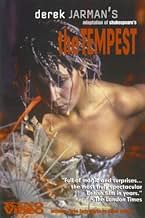CALIFICACIÓN DE IMDb
6.3/10
1.3 k
TU CALIFICACIÓN
Agrega una trama en tu idiomaBanished to a forsaken island, the Right Duke of Milan and Sorcerer Prospero gets the chance to take his revenge on the King of Naples with the assistance of his airy spirit-servant, Ariel.Banished to a forsaken island, the Right Duke of Milan and Sorcerer Prospero gets the chance to take his revenge on the King of Naples with the assistance of his airy spirit-servant, Ariel.Banished to a forsaken island, the Right Duke of Milan and Sorcerer Prospero gets the chance to take his revenge on the King of Naples with the assistance of his airy spirit-servant, Ariel.
- Dirección
- Guionistas
- Elenco
- Dirección
- Guionistas
- Todo el elenco y el equipo
- Producción, taquilla y más en IMDbPro
Opiniones destacadas
Into this primordial mix, add some seventeenth century magic, and you have Shakespeare's "The Tempest", a play whose themes are: freedom, temperance, repentance, and forgiveness. The main difference between Shakespeare's play and Derek Jarman's film is, of course, the nearly four hundred years of change in theatrics that separate the two artists.
Jarman's version tries to adhere to the play, in that the film uses quasi-Elizabethan linguistics, which renders the dialogue difficult to understand. The play's intent is still intact in the film, if a little obscured by the language, and is conveyed mostly through the acting and the cinematography, though "adapted" in style to a more contemporary audience. Hence, the film's inventive finale features a vocal rendition of "Stormy Weather", a modern metaphor for a message that spans the ages.
Even with the updated visuals, this film is going to be a bit much for most viewers. It is just too out of sync with what modern audiences expect. On the other hand, for those few who appreciate Shakespeare, the film can be insightful, with the proviso that it is not "pure" (or literal) Shakespeare.
Jarman's version tries to adhere to the play, in that the film uses quasi-Elizabethan linguistics, which renders the dialogue difficult to understand. The play's intent is still intact in the film, if a little obscured by the language, and is conveyed mostly through the acting and the cinematography, though "adapted" in style to a more contemporary audience. Hence, the film's inventive finale features a vocal rendition of "Stormy Weather", a modern metaphor for a message that spans the ages.
Even with the updated visuals, this film is going to be a bit much for most viewers. It is just too out of sync with what modern audiences expect. On the other hand, for those few who appreciate Shakespeare, the film can be insightful, with the proviso that it is not "pure" (or literal) Shakespeare.
"Speak the speech, I pray you, as I pronounc'd it to you, trippingly on the tongue; but if you mouth it, as many of our players do, I had as lief the town-crier spoke my lines."
Those are the directions that Hamlet gives the players on how to perform the Mousetrap. While the rhythms of Elizabethan English are difficult for Americans, they seems to come naturally for British actors, and those here perform it well enough.
The problems with this production arise, as they often do for THE TEMPEST, from the director's efforts to make it visually striking. Because of the magic that lies at the heart of Shakespeare's autumnal work, its gorgeous language has fallen prey to people who think the best way to stage it is to think what Quentin Crisp would sneer at as too camp and turn it up a couple of notches. One Shakespeare in the Park staging required a dozen people to play Ariel, including a Sumo wrestler; and Peter Greenaway's gloss on the play, PROSPERO'S BOOK, is so bad that when I saw it with some friends, I disrupted the occasion by guffawing at the over-the-top images. They show up here, too.
What all these geniuses fail to realize is that the play is a boy-meets-girl story, something Shakespeare wrote several dozen times. At its core is a coming-of-age story for Miranda, an adolescent girl who is old enough to leave her father. She is confronted by various male archetypes before settling on the only boy her own age. The Bard of Avon's message is so normal, that like should marry like, that youth calls to youth and that Show Business is the process of taking these ordinary and important stories and making us pay for them by wrapping them in mystery ... well, so normal that people miss the point.
The play's real magic is the story of Rapunzel and Snow White and all the other fairy tales which Bruno Bettelheim has shredded to show their symbolic content. That and the language. These should be enough for anyone like me, who cares for these things. It's too bad that the people who produced this version either don't care about Shakespeare or think that no normal person will.
Those are the directions that Hamlet gives the players on how to perform the Mousetrap. While the rhythms of Elizabethan English are difficult for Americans, they seems to come naturally for British actors, and those here perform it well enough.
The problems with this production arise, as they often do for THE TEMPEST, from the director's efforts to make it visually striking. Because of the magic that lies at the heart of Shakespeare's autumnal work, its gorgeous language has fallen prey to people who think the best way to stage it is to think what Quentin Crisp would sneer at as too camp and turn it up a couple of notches. One Shakespeare in the Park staging required a dozen people to play Ariel, including a Sumo wrestler; and Peter Greenaway's gloss on the play, PROSPERO'S BOOK, is so bad that when I saw it with some friends, I disrupted the occasion by guffawing at the over-the-top images. They show up here, too.
What all these geniuses fail to realize is that the play is a boy-meets-girl story, something Shakespeare wrote several dozen times. At its core is a coming-of-age story for Miranda, an adolescent girl who is old enough to leave her father. She is confronted by various male archetypes before settling on the only boy her own age. The Bard of Avon's message is so normal, that like should marry like, that youth calls to youth and that Show Business is the process of taking these ordinary and important stories and making us pay for them by wrapping them in mystery ... well, so normal that people miss the point.
The play's real magic is the story of Rapunzel and Snow White and all the other fairy tales which Bruno Bettelheim has shredded to show their symbolic content. That and the language. These should be enough for anyone like me, who cares for these things. It's too bad that the people who produced this version either don't care about Shakespeare or think that no normal person will.
I thought this was very "different" compared to most modern interpretations of Shakespeare and enjoyed it thoroughly. It would not be useful for those studying it at school etc. as it does not show the traditional Shakespeare character interpretations (i.e- Miranda is portrayed quite punky compared to your traditional Shakespeare lady) but for understanding of the play and for the basis of the story it is a very strong piece and fantastic to watch. It does not include also the correct format, as in the layout of acts and scenes as I am currently playing Miranda in a production and most of her lines had been cut and some scenes split and mixed around but it is very useful and I would definitely recommend it as a must-see even if just to say you've seen it! Shakespeare fans would love this!
This movie sucked. I was studying "the tempest' at school recently, and this being the most faithful adaption my teacher could find, we watched it.
Prospero looked more like an incarnation of Doctor Who, Miranda was some kind of seventies punk-brat (no change there, then, for toyah wilcox) and derek jarman clearly held the misguided notion that showing the fullfrontal scene of ferdinand clambering ashore in the buff would be enough to save this crap from descending into seat squirmingly, buttock clenchingly arduous cinema.
however, unsurprisingly, scenes added more for the titillation of the director than for the enrichment of the production will not (shock horror) help this utter trite.
Prospero looked more like an incarnation of Doctor Who, Miranda was some kind of seventies punk-brat (no change there, then, for toyah wilcox) and derek jarman clearly held the misguided notion that showing the fullfrontal scene of ferdinand clambering ashore in the buff would be enough to save this crap from descending into seat squirmingly, buttock clenchingly arduous cinema.
however, unsurprisingly, scenes added more for the titillation of the director than for the enrichment of the production will not (shock horror) help this utter trite.
The Tempest has been interpreted in many different ways ranging from more or less traditional views as dealing with Art to more post-modern approaches that like to dissect the play along post-colonial, feminist, gender or deconstructionist lines. The reason why Jarman's version left me fairly cold is that I didn't have a clue what he was on about. What is the underlying vision/idea/concept behind this rendering of Shakespeare? The previous reviewers do not get much further than revenge tragedy, punk show, but surely there is more to it, isn't there? This is not to say that there is no vision here, just that I was hard put to discover it. Be that as it may, there are still things to enjoy. The punk flavour is refreshing and funny. Toyah Wilcox as Miranda and Jack Birkett as Caliban are wonderful. I did not much care about Williams as Prospero ... not enough magic I suppose. The switches between the old monastery/castle and the (very English) world outside can be a little unsettling at times, but I guess that is intentional. All in all, interesting but not quite the success I had hoped it might be (particularly after seeing Jarman's Caravaggio).
¿Sabías que…?
- TriviaThe role of Prospero was originally intended for an older actor and John Gielgud was approached but declined. It was then offered to Terry-Thomas but his failing health caused him to turn it down. The character was then rewritten as a younger Prospero and Heathcote Williams was cast.
- Citas
Miranda, his daughter: Oh, how beauteous mankind is. O brave new world that has such people in it!
- Créditos curiososMany Thanks To All Those Who Took An Interest and Especially... and All The Sailors Who Weathered The Storm.
- ConexionesFeatured in Toyah (1980)
- Bandas sonorasStormy Weather
Written by Harold Arlen & Ted Koehler
Performed by Stephen Pruslin (as Steven Pruslin) and Dave Campbell
Sung by Elisabeth Welch
Arranged by Stephen Pruslin (as Steven Pruslin)
Produced by Guy Ford
Selecciones populares
Inicia sesión para calificar y agrega a la lista de videos para obtener recomendaciones personalizadas
- How long is The Tempest?Con tecnología de Alexa
Detalles
- Fecha de lanzamiento
- País de origen
- Sitio oficial
- Idioma
- También se conoce como
- Der Sturm - The Tempest
- Locaciones de filmación
- Productora
- Ver más créditos de la compañía en IMDbPro
Taquilla
- Presupuesto
- GBP 150,000 (estimado)
- Total a nivel mundial
- USD 813
- Tiempo de ejecución
- 1h 35min(95 min)
- Mezcla de sonido
- Relación de aspecto
- 1.37 : 1
Contribuir a esta página
Sugiere una edición o agrega el contenido que falta














